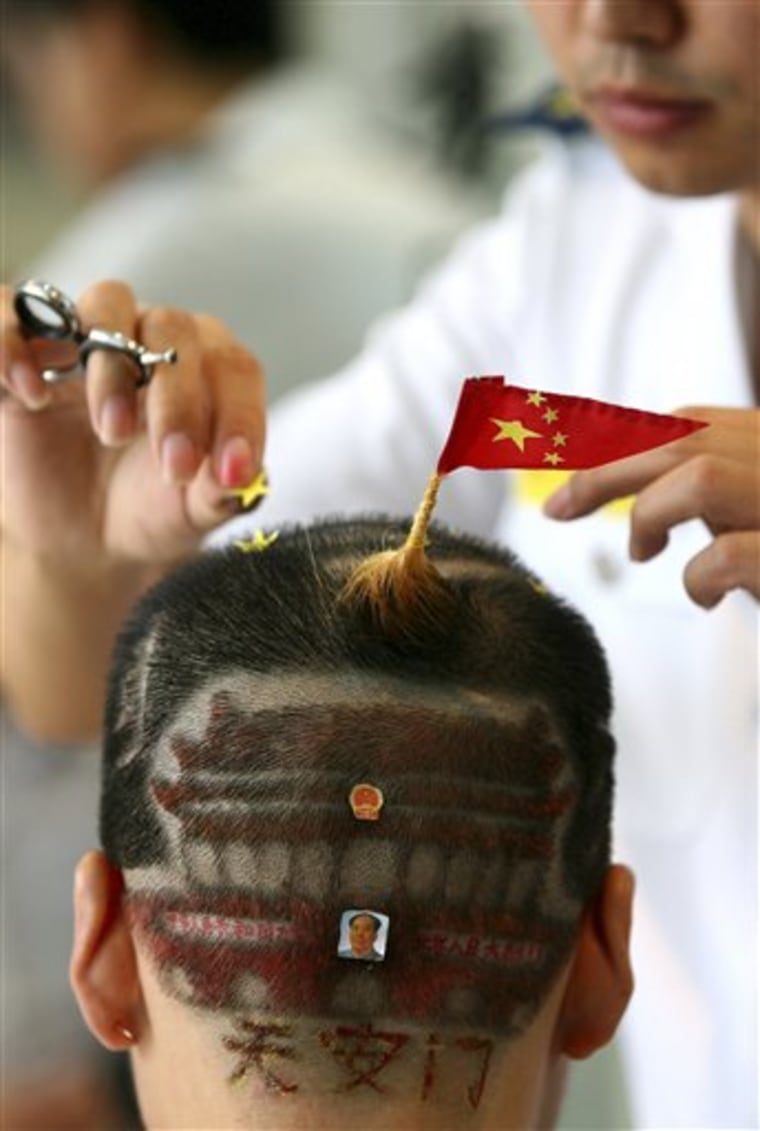Police cleared streets and office buildings in parts of China's capital Friday for a full dress rehearsal of celebrations for 60 years of communist rule, touching off a mixture of excitement and resentment among ordinary Chinese told to stay away.
Patrons and employees spilled out on to the streets from offices, shops and restaurants shortly after lunch, hustling to subways and buses to meet a curfew in all-but name. Tactical police units with automatic rifles and paramilitary police lined thoroughfares as camouflaged tanks, trucks bearing intercontinental ballistic missiles and parade floats with models of the Great Hall of the People rumbled toward Tiananmen Square for a late-night practice for the Oct. 1 parade.
There were no crowds to cheer. The convoys passed sidewalks empty except for security. Notices went out earlier in the week politely suggesting that people working in the no-go zones leave by late afternoon and people living there stay home.
Still, the curious craned from side streets for a glimpse, sometimes in frustration. "We can't watch. They won't let us," said Yang Weiying, a waitress at a restaurant, pointing to a line of police and orange-vested civilian volunteers down the street. "It's very upsetting."
Parade should rival Olympics
The parade with its displays of mass precision and military firepower is likely to delight and inspire patriotism when it's broadcast live nationwide. It's a spectacle to rival last year's roundly praised Beijing Olympic Games opening ceremony. Some 200,000 people will perform, among them 80,000 primary and secondary school students who will flip cards on cue to form pictures and Chinese characters.
Many Chinese are justifiably proud of what China has achieved since the People's Republic was founded in 1949 — a transformation from an impoverished, war-wracked country to an economic and diplomatic power. "The motherland everyday gets greater and stronger. I'm truly happy," said Zhang Lianfa, a middle-age worker, milling about a neighborhood of four-story apartment buildings as mechanized artillery rattled by a block away.
The heavy security is partly an attempt to keep under wraps key features of the parade to build suspense for the celebrations and partly intended to prevent any disruptions. The government is worried about a spillover from the recent ethnic unrest in its volatile western region of Xinjiang as well as trouble from petitioners who pour into the capital to complain about local injustices.
But the painstaking preparations are also underscoring a gulf between the Communist Party leadership, which wants nothing to go amiss during the high-profile anniversary, and Beijing residents empowered by rising living standards.
Some in the capital have complained about the security restrictions and preparations that exclude the public and harken back to an earlier Soviet-style era. State media have hyped the sacrifices soldiers are making for the parade.
Among those profiled are thousands of troops who have spent the past four months drilling to march in step on a practice ground that features a full-scale model of the Avenue of Eternal Peace and the leadership reviewing stand they will march before.
"I think it's ridiculous how the government is wasting so much manpower and money on this celebration. Of course, it's not a good thing to shut the city down like this," said Zhang Zhu, a 26-year-old employee of an Internet company on his way home.
Criticism online — the least censored of China's heavily regulated media — has been more pointed. One young executive described a five-hour odyssey to get home during a dry run of the military parade two weeks ago. Subways blew past transfer stations because they were under the parade routes, and no taxis were available.
"I have no hatred and only a little hope. I hope that there won't be any 70th anniversary. Either I'll be dead or this (communist) party country, you go to die," said the executive, who used the online name Redares and wrote 'go to die' in English.
Beijing has been swathed in tightening security in recent weeks, from drunk-driving checkpoints to late-night ID checks at road blocks, as well as the usual police roundups of activists. Qi Zhiyong, an activist wounded in the 1989 military crackdown on the Tiananmen democracy movement, said Friday that officers put him in a police car and drove him around Beijing, away from the rehearsal routes.
The government is mindful of the changes under way in society and has sought to minimize the disruptions caused by the rehearsals. City authorities flooded television and radio and sent cell-phone text messages with warnings about the traffic restrictions.
"The government is using more ways to publicize information than 10 years ago. They are using the Internet, which is a fairly new thing compared to the 50th anniversary," said Liu Shanying, a public administration researcher at the Chinese Academy of Social Sciences. "They've done their work a lot better this time."
Many people were not so much enthused by the rehearsal as happy to get an early start to the weekend. One suited executive strolled out of work with a golf bag. "This is very convenient," said Yang Xiao, an accountant working in the central business district. "You don't have to work this afternoon."
